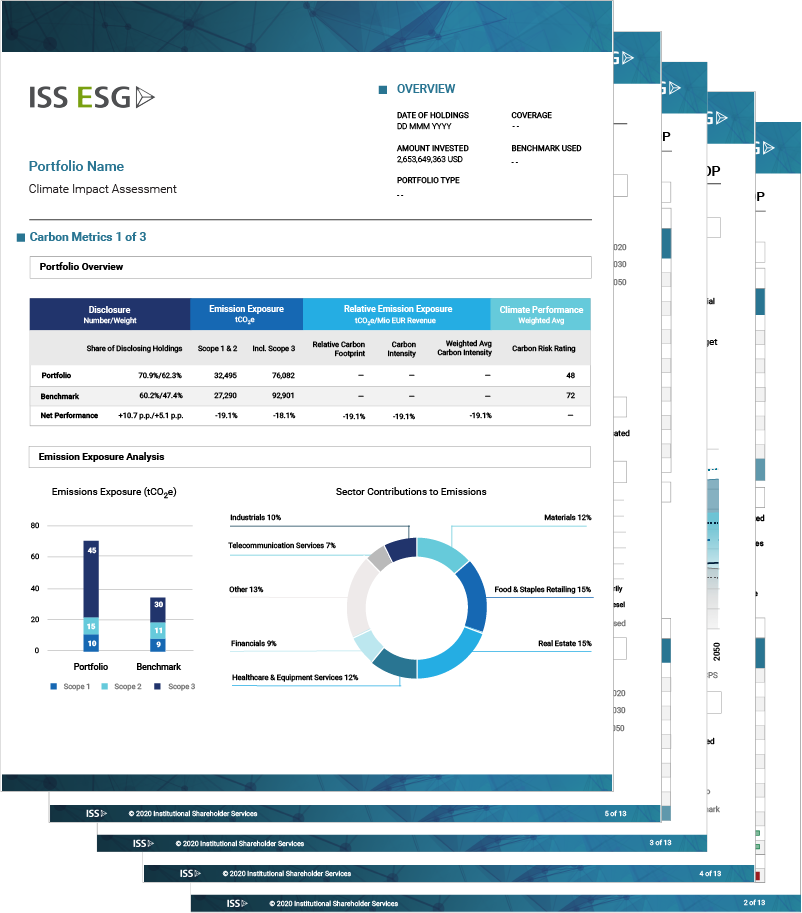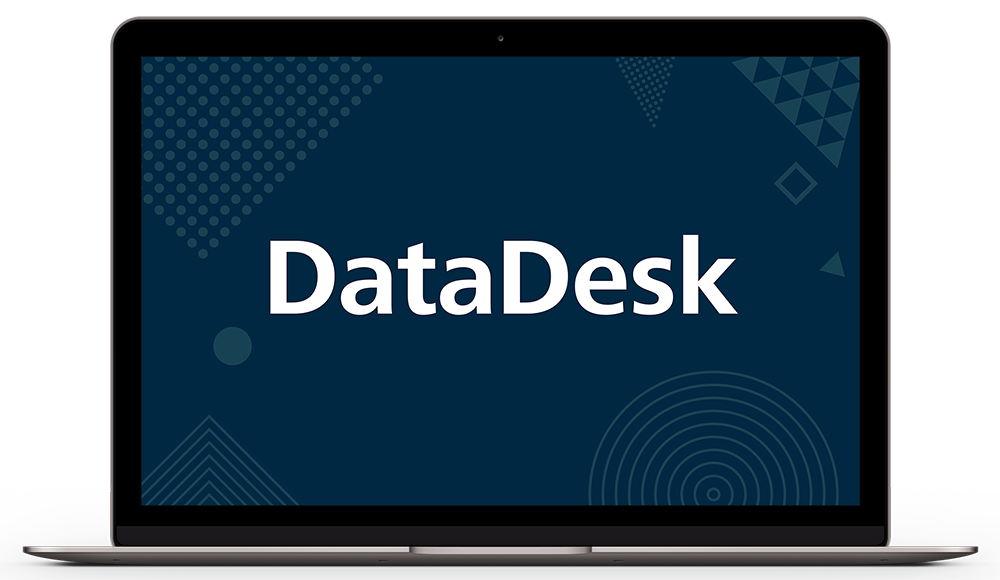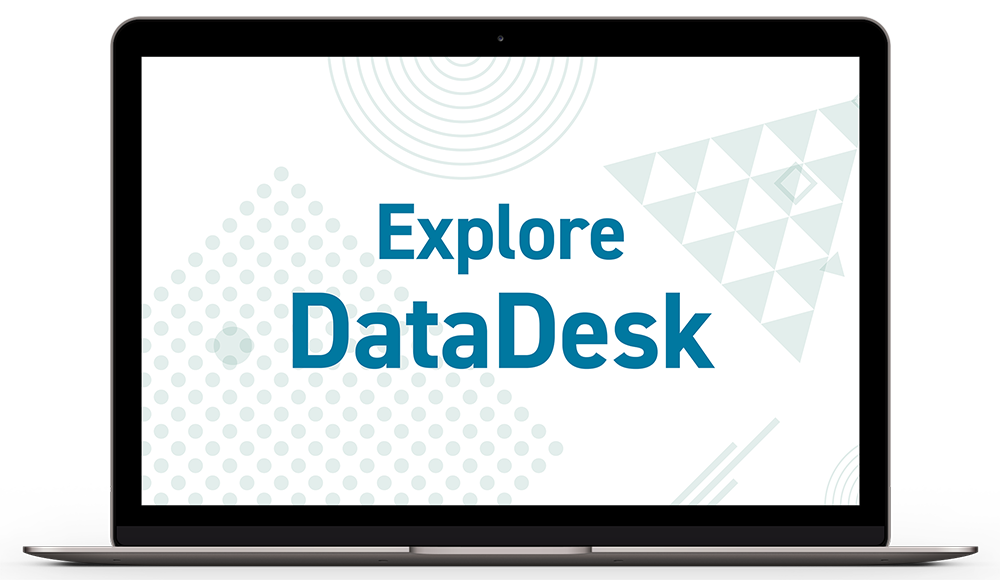SUSTAINABILITY SOLUTIONS / CLIMATE SOLUTIONS
Climate Analytics
Manage your exposure to climate-related risks.
Our dedicated team of experts provides market participants, governments and academics with market-leading carbon data and climate data as well as state-of-the art portfolio analysis tools.
Portfolio Analytics – Corporates
Our proprietary analytics tools on our DataDesk platform enable investors to instantly assess climate risk portfolio exposure. For public equity and fixed income strategies, our Climate Impact Reports provide detailed analyses of Scope 1, 2, and 3 emissions, transition and physical risk and climate scenario alignment. Scenario alignment can be assessed against IEA, NGFS and OECM models, including scenarios aligned to Net Zero emissions by 2050 that are themselves based on the Glasgow Financial Alliance for Net Zero (GFANZ) recommendations.
Fulfill Reporting Requirements
Our reports are designed to support investors who want to align their portfolios to the goal of maintaining a 1.5°C trajectory, aligned to the Paris Agreement. Furthermore, these reports can help investors address key internal and external climate disclosures, including TCFD-based reporting initiatives where climate scenario analysis and scenario alignment are core elements of their disclosure requirements.
Key Metrics

AVAILABLE REPORTS: Climate Impact Report, Carbon Footprint Report
TCFD METRICS
Includes the TCFD’s weighted average carbon intensity and additional metrics assessing climate-related risks and opportunities.
SCENARIO ALIGNMENT
Assessment of a portfolio’s alignment with up to 22 climate scenarios provided by leading models: International Energy Agency’s World Energy Outlook 2022 (IEA), the United Nations Environment Programme’s One Earth Climate Model (OECM), and the Network for Greening the Financial System (NGFS). The analysis includes implied temperature rise, cumulative alignment metrics, cross-point year, and transparency indicators.
STRESS TESTING
Analyze how different climate scenarios can impact the financial performance of your portfolio.
CARBON FOOTPRINT DATA
Scope 1, 2, and 3 emissions, including emission intensities.
TRANSITION RISKS
Detailed assessment of company and portfolio exposure to transition risks and opportunities related to carbon pricing and demand changes, impacts on operating costs and revenues, fossil fuel reserves, power generation, and controversial energy extraction practices. Includes forward-looking returns-based analysis quantifying the potential financial impact of a net zero scenario.
PHYSICAL RISKS
Provides estimates of financial impact due to increasing hazard intensity for the most likely and worst-case scenarios by 2050 across the five most costly weather hazards: floods, heat stress, wildfires, tropical cyclones, and drought.
Investors want to deepen their understanding of the financial impact of physical climate-related risks on their investments. With climate change expected to increase the occurrence and intensity of severe weather hazard impacts, the value of portfolio holdings could be adversely affected.
Physical Climate Risk Analysis: Gauging Climate Change Impacts on Your Portfolio
This video explores our physical climate risk analysis tool, which enables investors to model hazard intensity increases, for likely and worst-case scenarios by 2050, across five of the costliest hazards: wildfires, tropical cyclones, heat stress, floods, and drought.
Portfolio Analytics – Sovereigns
We offer Climate Impact Reports for Sovereigns (including Sub-sovereigns), via our DataDesk platform. Our Sovereign Climate Impact Reports help analyze carbon emissions, scenario alignment, climate change policy, and transition risk at the Sovereign level. They also help carbon emissions analysis at the Sub-sovereign level.
They provide deeper understanding, more precise measurement, and facilitate clearer reporting when assessing Sovereign and Sub-sovereign climate-related risks. Furthermore, our forward-looking climate impact data allows investors to act with confidence in relation to their Sovereign portfolios.
Climate Risk & Impact Data
Access the broadest and deepest carbon and climate dataset in the market
- Forward-looking assessment of the climate-related performance of companies, considering industry-specific challenges and risk profiles as well as companies’ positive impact.
- Assessment of companies’ involvement in the extraction of fossil fuels, and the generation of power from fossil fuels, nuclear and renewable sources.
- Proprietary analysis based on latest available peer-reviewed climate models (CMIP5)
- Includes Physical Risk Score allowing peer comparisons, Value at Risk and Physical Risk Management Score.
Assessment of a portfolio’s alignment with up to 22 climate scenarios provided by leading models:
- International Energy Agency’s World Energy Outlook 2022 (IEA)
- The United Nations Environment Programme’s One Earth Climate Model (OECM)
- The Network for Greening the Financial System (NGFS).
- Includes data on output and installed capacity derived from power generation from fossil fuels (coal, oil, and natural gas), renewable energy (wind, solar, hydro, biomass, geothermal, and nuclear power), and other sources.
Broad coverage with >180 Sovereign Risk Exposure and Climate Data factors, including:
- Absolute and intensity greenhouse gas emissions data from production emissions (as reported to the United Nations Framework Convention on Climate Change (UNFCCC)), aligned with the PCAF methodology
- Scope 1, LULUCF emissions and relevant emissions intensities of sub-sovereigns
- Includes the TCFD’s weighted average carbon intensity by scope. Transition Risk and Climate Policy Ratification, including data on sovereign energy mix and fossil fuel dependency and reserves.
- Alignment to Net Zero emissions by 2050 using climate scenarios provided by the Network for Greening the Financial System (NGFS).
- Alternative asset classes: e.g. private loans, real estate, and infrastructure
- Potential Avoided Emissions: e.g. companies, infrastructure, and green bonds
- Environmental Impact: e.g. deforestation and water
- Detailed assessment of absolute and relative Scope 1, 2 and 3 greenhouse gas emissions
- Bespoke analysis of transition and physical risk as well as scenario alignment possible
- Allows banks and insurance companies, that need to comply with mandatory climate-related disclosure frameworks, such as the Corporate Sustainability Reporting Directive (CSRD) and European Banking Authority (EBA) Pillar 3, to estimate emissions for non-listed companies, small and medium enterprises, and other alternative investments.









